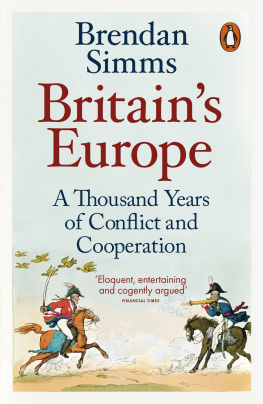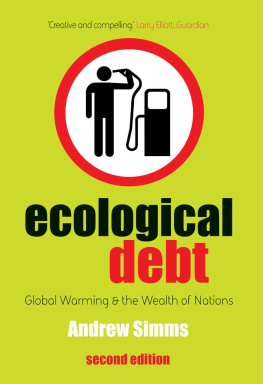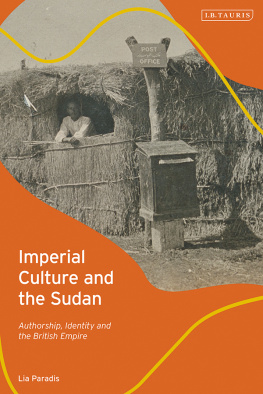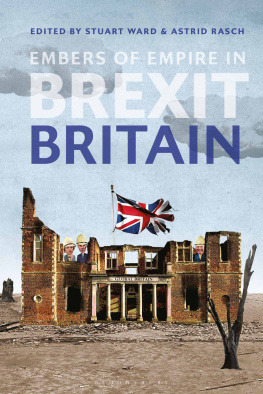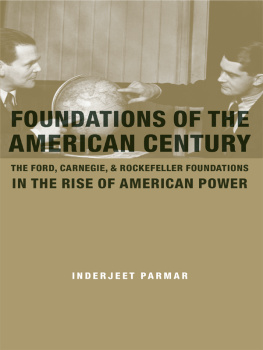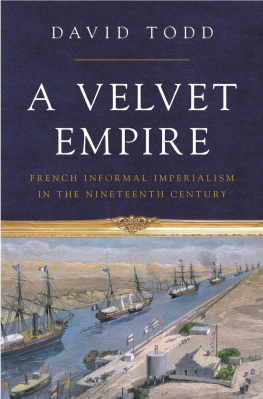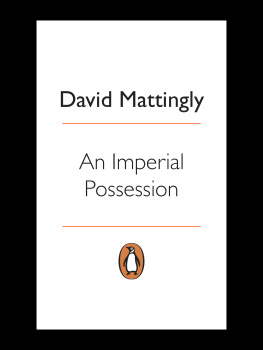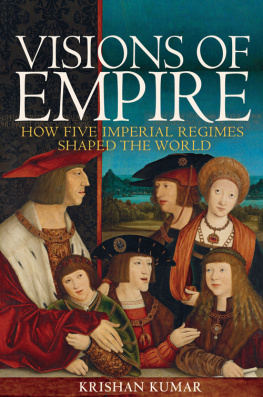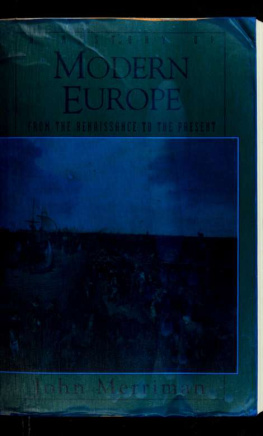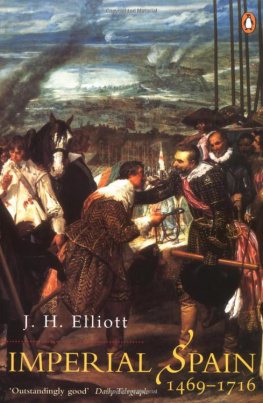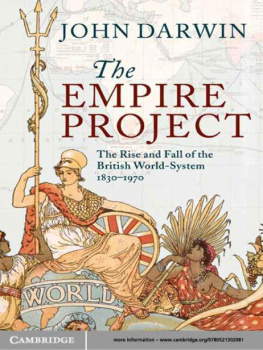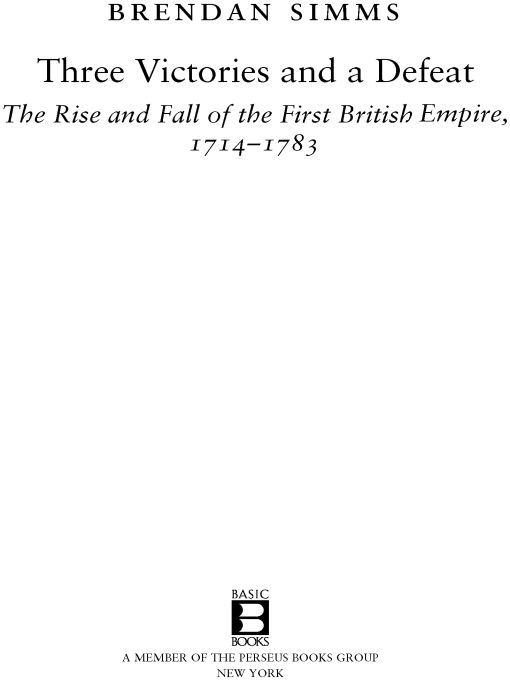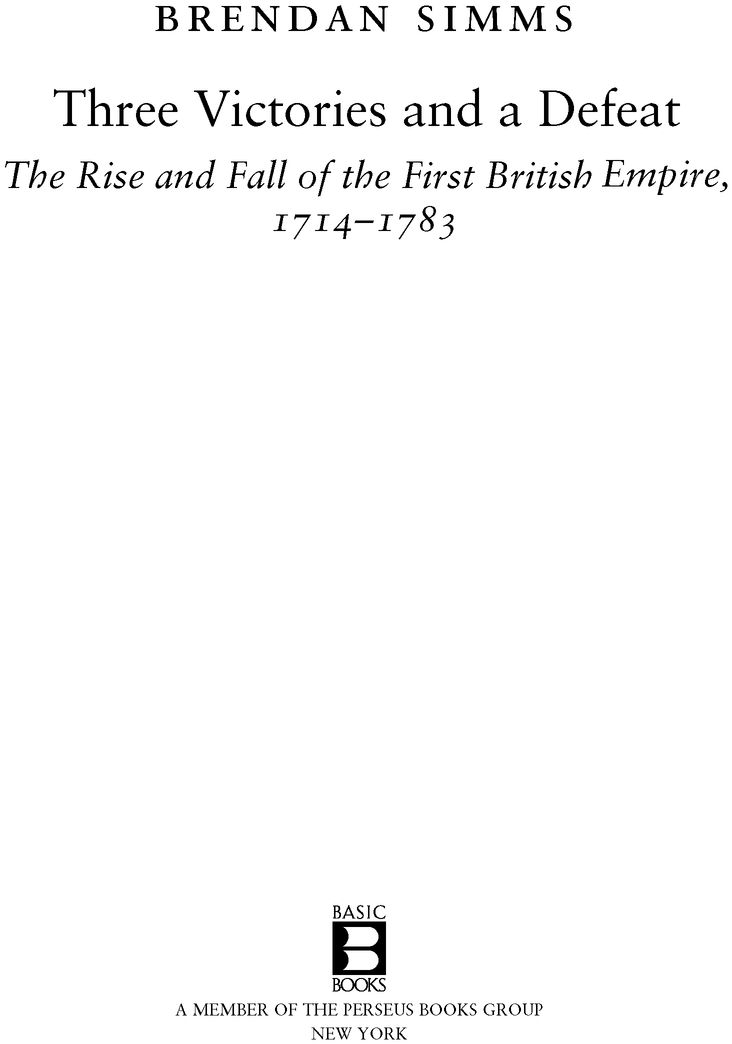Table of Contents
THREE VICTORIES AND A DEFEAT
A powerful new book about Britains rise to imperial power...
[challenges] our deepest preconceptioins about British identity
Ed Smith, The Times
A bold and convincing account Ben Wilson, Spectator
An insightful book that will make even jaded readers think
differently about an entire century Independent on Sunday,
Books of the Year
There is no arguing with his scholarship, and there is no better
history of British foreign policy in this crucial period
Daily Telegraph, Books of the Year
Brendan Simms is an extraordinary historian and his
reinterpretation of British history in the eighteenth century is
one of those sleeper ideas that, along with others, is gradually
challenging know-nothing Euro-scepticism
Observer, Five bright ideas that illuminated 2007
An impressive piece of scholarship... Im sure this will be
required reading for students of the period
Geoffrey Moorhouse, Guardian
Shrewd and insightful... Simmss book is a monument to
scholarship and erudition and is continually absorbing
Frank McLynn, BBC History
For Anita
Note on Dating and Quotations
Until 1752, most Britons used the old Julian calendar, which was eleven days behind the newer Gregorian calendar in use throughout most of the rest of Europe. Very often, correspondence cited both dates, which is confusing. I have changed the dating to the newer style throughout except where the overlap between months was not clear with Older Style dates, which are thus marked (OS).
This book makes extensive use of quotations from parliamentary debates. Most of these are taken from Cobbetts Parliamentary history, which is not a verbatim record in the style of Hansard today, but a compilation based on diverse pamphlet and other sources. The orations are usually rendered in indirect speech. To reproduce this directly would be too stilted, and so I have had recourse to a combination of brackets, elisions and quotation which faithfully renders the sense of what was reportedly said.
I have quoted extensively from a wide variety of sources: to avoid distracting inconsistency, spelling (and occasionally punctuation) has been modernized.
Acknowledgements
This book could not have been written without the help of others, living and dead. I hope that the reduced annotation - the original volume of which made even my indulgent publishers blench - will pay adequate tribute to most of the existing literature. All the same, I would like to single out here those who have most influenced me. These authors not only gave me a framework to follow, or sometimes to struggle against, but also helped to direct my archival researches. If this book is based on extensive archival records and contains some important fresh material, the author would never have got anywhere if he had not been guided to it by previous generations of historians.
My first and greatest debt is to the leading eighteenth-century international historian, Hamish Scott. He is the latest in a long line of historians from A. W. Ward through Sir Richard Lodge, Basil Williams, Richard Pares and D. B. Horn, who have stressed the importance of the European connection to British history in the eighteenth century. Hamish was kind enough to comment on the entire manuscript, and save me from excruciating error. He also helped me in too many other ways to record here. I thank my old friend Chris Clark, who commented in detail on the text from beginning to end. Whatever clarity the finished product possesses is to large degree his achievement. My interest in the Hanoverian connection was first awakened by my PhD supervisor Tim Blanning, to whom I have had opportunity to express my gratitude in his Festschrift (Hamish Scott and Brendan Simms (eds.), Cultures of power in Europe during the long eighteenth century, Cambridge University Press, 2007). It has been sustained and refined by the colleagues who contributed to Brendan Simms and Torsten Riotte (eds.), The Hanoverian dimension in British history, 1714-1837 (Cambridge, 2007), especially those concentrating on the period before 1783: Andrew Thompson, Nick Harding and my dynastic advisor, Clarissa Campbell Orr.
My understanding of the sixteenth- and seventeenth-century background was greatly increased by the work of R. B. Wernham, David Trim, J. H. Elliott, Jonathan Scott, Jonathan Israel, and many conversations with my colleagues John Adamson and Scott Mandelbrote. My treatment of George I is greatly dependent on his biographer Ragnhild Hatton and on the pioneering work of Wolfgang Michael. I was also helped by a number of other fine biographies, including Reed Browning on the Duke of Newcastle, and Marie Peters on William Pitt the Elder. The chapter on the Spanish depredations is heavily indebted to Philip Woodfine, and my views on colonial and maritime issues have been strongly influenced by Richard Pares. My understanding of colonial America profited immensely from reading Robert Tucker and David Hendricksen on the problem of imperial defence after 1763; Marc Egnal on the expansionists; Theodore Draper on the political nature of the transatlantic divide; the comments of Gideon Mailer; and Gerald Stourzh on the geopolitics of Benjamin Franklin. The work of P. J. Marshall helped me to understand the problems of Empire after 1763. More generally, the work of Bob Harris for the mid eighteenth century and Stephen Conway for the later period has convinced me how important the European connection was for British social and cultural history.
I am also very aware of how much I owe those with whom I sometimes disagree. Jeremy Black is very much a Tory to my Whig, but I would simply have been lost without his work on the early eighteenth century, to which I returned again and again. I think of Great Britain in less naval terms than Nicholas Rodger, but his Command of the ocean is unlikely ever to be equalled. I stress the importance of Continental strategies more than Daniel Baugh, but I have been greatly stimulated by his work on the blue water policy. Likewise, this book stresses the European focus and identity of eighteenth-century Britain, but engagement with the new imperial and Atlantic history of David Armitage, Kathleen Wilson and others has helped me to clarify my thoughts. Although this book emphasizes the importance of the Hanoverian dimension to the development of British identity and xenophobia in the eighteenth century, the work of Linda Colley on Francophobia and anti-Catholicism must remain the starting point for any serious investigation.
I also received a great deal of practical help from librarians and archivists, and from assistants. I would have been sunk without the copying efforts of Jasper Heinzen, Geoffrey Dumbreck and Doohwan Ahn; and I am most grateful to the latter for accessing so many printed sources online. Miranda Long very kindly helped with those online sources as well as performing many other tasks, and I am most grateful to Hazel Dunn for assisting with the bibliography so efficiently.
Having said all this, all remaining mistakes are of course my own.
I also thank my colleagues at the Centre of International Studies at Cambridge for their support, company and intellectual stimulation. I am especially grateful to Jonathan Haslam, who led me in that direction. I could not have had two better Heads of Department: James Mayall and Christopher Hill, who gave me time to complete this project. The Chairman of the Degree Committee, my fellow historian Charles Jones, put me deeply in his debt. I am also hugely grateful to Wendy Cooke and Wendy Slaninka, and the irreplaceable Matthew Ham. All of them have made the Centre an excellent place to work.


